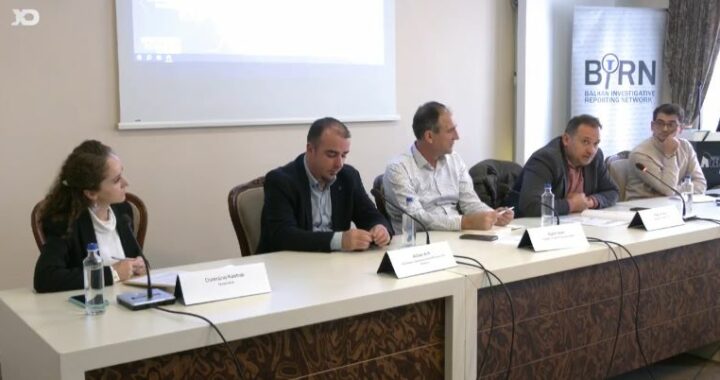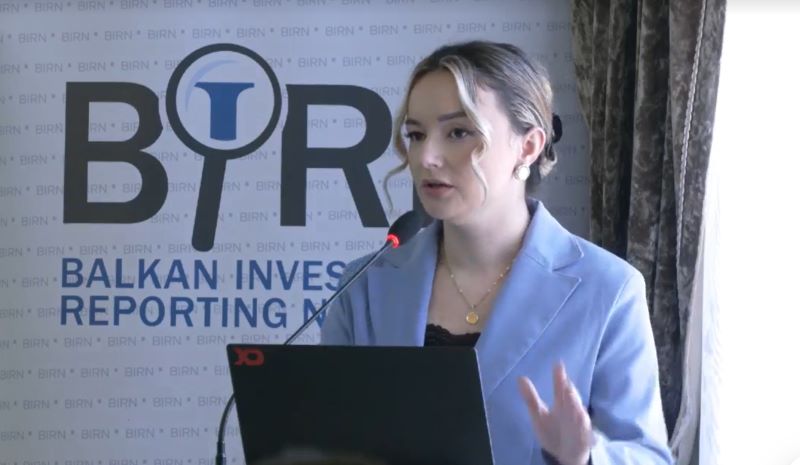

 The Presentation of '‘Open Data and Digitalization in the Western Balkans: The State of Play,’ report on October 25 in Prishtina. Photo: BIRN
The Presentation of '‘Open Data and Digitalization in the Western Balkans: The State of Play,’ report on October 25 in Prishtina. Photo: BIRN
A new BRIN’s report reveals that when it comes to open data and digitalization, Western Balkan countries lack infrastructure and resources.
The report ‘Open Data and Digitalization in the Western Balkans: The State of Play,’
Presented in a conference on Friday in Prishtina, concluded that advancement of open data and digitalization in the Western Balkan countries lack political commitment and have limited infrastructure institutional resources.
Experts emphasise that the delicate balance between transparency and data protection needs continuous reform and support from both government and civil society.
Xheneta Murtezaj, a BIRN Kosovo researcher, explained that the research team “reviewed how data is published, in what format, and whether it is accessible,” and found that data on some government portals is rarely updated.
“Research revealed that donors play a crucial role in supporting open data and digitization initiatives,” she said, adding that “new platforms often stagnate once donor funding ends, as institutions lack the willingness to push these projects forward independently.”

The report concludes that the level and pace of open data and digitalization adoption across countries depends on various contextual, societal factors, including the overall state of democracies and good governance, political support, readiness and motivation in society, and the level of economic development.
Plator Avdiu, project coordinator at the think tank Kosovo Democratic Institute, KDI, remarked on the differences between Kosovo and neighbouring countries.
“Bosnia faces challenges due to its complex state structure, which makes data management more decentralised. Serbia and Turkey have shown reservations about sharing non-public data with civil society, as not all open data is public,” he explained.
According to the report, independent media and CSOs in Serbia gathered evidence of organised trolling attacks, AI-generated deep fake videos targeting opposition politicians, and unlawful surveillance.
In Bosnia and Herzegovina, disjointed administration effectively slows the centralised implementation of e-government services at the country level.
In Montenegro, low standards in cyber security offer an inadequate response to hacker attacks and data leaks. An open data service portal suffered a hacking cyber-attack in 2022 and services have not yet been recovered.
The same year, Albanian government systems, albeit not on the e-Albania platform itself, were hit in July and September by large-scale cyber-attacks, which led to temporary disruptions of most online public services.

In Kosovo, despite millions of public funds spent, there is no functional digital information for the health system, as the platform was allowed to become dormant.
Avdiu from KDI declared that a major challenge with open data in Kosovo lies in its lack of interoperability across government sectors.
He noted that Kosovo has made progress in specific areas like procurement and asset declaration despite being a relatively recent Open Government Partnership member, “performing better than regional counterparts.”
“Perhaps Bosnia has more issues due to its state structure, which makes any analysis more challenging, as the structures manage data in an autonomous way. Serbia and Turkey often have reservations about cooperating with civil society for data sharing that is not public, as not all open data is public data,” Avdiu added.
Arbian Arifi, Acting Director of the Department for Personal Data Protection at Kosovo’s Agency for Information and Privacy, explained that “personal data protection can often conflict with open data initiatives, as many public documents contain personal data.”
Nonetheless, he emphasised that “transparency should not come at the cost of privacy rights.”
According to Arifi, “open data should be available on a state portal, with a designated official in each ministry responsible for updating the portal,” without the need of formal access requests.
In Kosovo there are cases when municipalities share private information. For example, Gjakova municipality shared health data when distributing subsidies for people with special needs. The Agency “fined the municipality as health data should not be equated with transparency.”
“Copies of ID cards and educational certificates are not essential for the public,” he stated.
Agron Ibishi, an IT expert in Public Procurement in Kosovo, highlighted advancements in open data since 2016, with the introduction of e-procurement aimed at streamlining processes and increasing efficiency for both contracting authorities and economic operators.
However, Besfort Guri, a board member of the NGO Free Libre Open Source Software Kosova, emphasised that open data remains limited in specific sectors.
“The statistics agency has only three open datasets on the OGP (Open Government Partnership) platform. More datasets, including urban planning information currently available only as PDFs, should be accessible,” Guri suggested.
25 October 2024 - 19:40

A BIRN report found that the Western Balkans and Turkey have moved clo...

At a time when lies can be fabricated in seconds and politics can be m...

Kremlin-aligned actors are exploiting instability in the Western Balka...

The Balkan Investigative Reporting Network concluded a three-day regio...